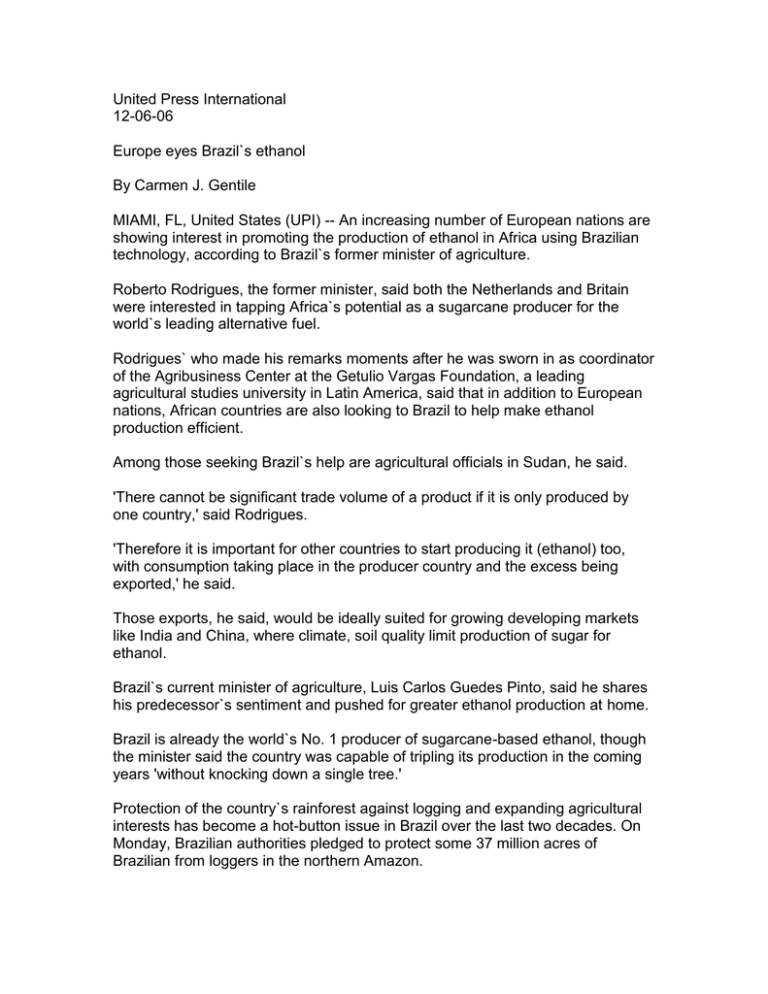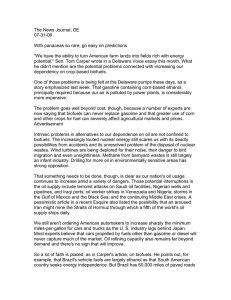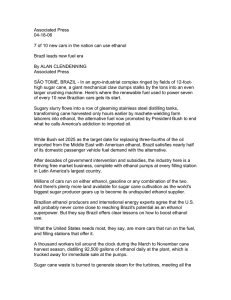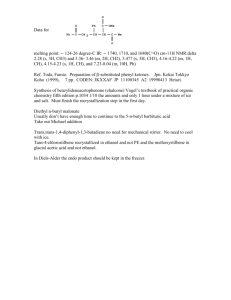United Press International 12-06-06 Europe eyes Brazil`s ethanol
advertisement

United Press International 12-06-06 Europe eyes Brazil`s ethanol By Carmen J. Gentile MIAMI, FL, United States (UPI) -- An increasing number of European nations are showing interest in promoting the production of ethanol in Africa using Brazilian technology, according to Brazil`s former minister of agriculture. Roberto Rodrigues, the former minister, said both the Netherlands and Britain were interested in tapping Africa`s potential as a sugarcane producer for the world`s leading alternative fuel. Rodrigues` who made his remarks moments after he was sworn in as coordinator of the Agribusiness Center at the Getulio Vargas Foundation, a leading agricultural studies university in Latin America, said that in addition to European nations, African countries are also looking to Brazil to help make ethanol production efficient. Among those seeking Brazil`s help are agricultural officials in Sudan, he said. 'There cannot be significant trade volume of a product if it is only produced by one country,' said Rodrigues. 'Therefore it is important for other countries to start producing it (ethanol) too, with consumption taking place in the producer country and the excess being exported,' he said. Those exports, he said, would be ideally suited for growing developing markets like India and China, where climate, soil quality limit production of sugar for ethanol. Brazil`s current minister of agriculture, Luis Carlos Guedes Pinto, said he shares his predecessor`s sentiment and pushed for greater ethanol production at home. Brazil is already the world`s No. 1 producer of sugarcane-based ethanol, though the minister said the country was capable of tripling its production in the coming years 'without knocking down a single tree.' Protection of the country`s rainforest against logging and expanding agricultural interests has become a hot-button issue in Brazil over the last two decades. On Monday, Brazilian authorities pledged to protect some 37 million acres of Brazilian from loggers in the northern Amazon. Meanwhile, Brazil`s global leadership in ethanol production had already caught the eye of Britain, which announced earlier this year it was teaming up with Brazil to promote sugar growth in Africa. South Africa and Mozambique are reportedly on the short list of candidate nations for expanding the ethanol market in the region, said ethanol experts at the Food and Agricultural Policy Research Institute at Iowa State University. 'The commitment of both countries is to develop other (ethanol) supplier countries,' said Brazilian Industry and Trade Minister Luiz Furlan in November. 'It`s a product that needs to become more available to (global) consumers.' British Secretary of State for Trade and Industry Alistair Darling, during his recent visit to Brazil, noted that after test-driving one of Brazil`s 'flex-fuel' cars -- vehicles that can run on either gasoline or a combination of ethanol and petroleum-based fuel -- he could 'now confront any car manufacturer in Europe who tells me that people won`t buy cars powered by ethanol.' His endorsement bodes well for the future of ethanol in what is projected to be a lucrative EU market for the fuel. Britain is reportedly keen on pairing up with Brazil because it us a proven leader in the global ethanol market, exporting some 18 million tons of sugar in 2005 and a worldwide in the ethanol industry. Brazil`s prowess in the industry is well documented, as the South American country has been involved in the ethanol fuel trade since the 1970s. In 1975, Brazil`s Pro-Ethanol Program subsidized sugar mills to produce extra product specifically for the production of the biofuel in the wake of the oil price spike experienced worldwide. But the program was slow going at first and relied on federal funding. Then, in the late 1980s, it suffered an almost terminal blow when world sugar prices peaked, souring many motorists and cane producers to ethanol. 'There is an increased interest in renewable fuels and Brazil is already a major supplier on the global market,' said FAPRI ethanol analyst Simla Tokgoz. Both nations are also reportedly interested in developing the infrastructure needed to enhance sugar production in both nations, noted fellow FAPRI ethanol specialist Amani Elobeid. 'The viability is there,' said Elobeid, who added that Britain is a leader among EU nations investigating the feasibility of ethanol as a long-term solution to future fuel needs.



